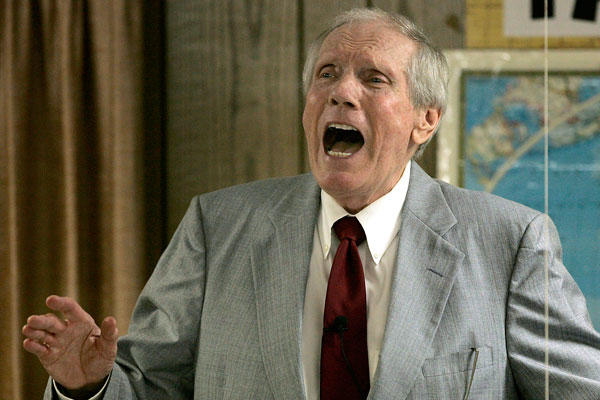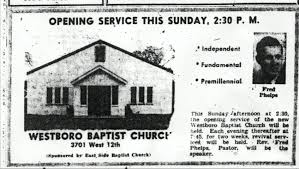Fred Phelps, the controversial founder of Westboro Baptist Church, died last week. If you want to know more about Fred, you’ll have to read elsewhere. Was he really excommunicated from his church near the end of his life? I don’t know. In a case of reverse-Damascus-road, is it true he was a civil-rights lawyer as a young man? Weird, if true.
I am more interested in the reaction to Phelps’s death. It seemed like even before he was pronounced dead, I saw all sorts of writing and posts about God’s mercy, even for Fred. Christians seemed to be tripping over themselves trying to do outdo one another in being gracious and compassionate to Fred. It reminded me of the reaction by some to the death of Osama bin Laden. Every possible precaution taken to avoid triumphalism, recrimination, or celebration.
I get it. Trying to be Christ-like. Turning the other cheek. Going the extra mile. No judgment. Not mimicking the hateful bile of Phelps. But some of it felt a little self-righteous, maybe even moralistic. A bit of me wondered if this reaction was really authentic. It felt too smooth and easy. Did it suppress all the pain this man has caused? Were we too quickly whitewashing all the vitriol he has spewed?
I also saw some of the opposite reaction to Phelps’s death. “Let him rot in hell!” “Glad he’s dead.” “May he receive tenfold what he gave.” I understand this reaction too, even if I don’t endorse it. It has a visceral truth to it. Too often when watching the TV news, I find myself muttering, “I hope there is special place in hell for people like that.”
We move toward the cross in this season of Lent. We consider once more what it means, what was accomplished. Recent discussions of “atonement theory”—what did Christ’s death do and show and change—have been plentiful. The reactions to Fred Phelps’s death share some of the same shades and wrinkles as these atonement conversations. (For a helpful glance at atonement conversations, look the interview “Abuse, Violence, Sacrifice, and the Cross,” with Gabriel Fackre, George Hunsinger and Leanne Van Dyk, in Perspectives a few years ago.)
There has been a strong push to understand what Christ’s death accomplished in non-violent terms. By and large, I have great sympathy for this. None of us want Jesus’s death to be understood as a violent father releasing his anger by abusing his child. A god placated by blood would seem to have more in common with some primitive idol than the God of Abraham, Isaac, and Jacob. At a slightly more sophisticated level, pitting the persons of the Trinity against each other is just bad theology. Even terms like wrath, worthiness, punishment, or holiness, while somewhat scriptural, carry so much freight, and have been distorted in such unfortunate ways, that I often think we Christians should give them a 200 year hiatus.
That being said, I also wonder if some of the more recent directions in atonement theory, and some of the gushingly gracious reactions to Phelps’s death, forget that love has a cost. Grace is difficult. Forgiveness is painful. God did not wave a magic wand or casually shake the cosmic Eth-a-Sketch to redeem creation. God chose the costly love of incarnation, servanthood, and death.
When I think about Fred Phelps’s destiny, I don’t mind if God embraces him as one more wayward child robed in the gleaming wholeness of Christ. I’m glad to err toward what Richard Mouw calls the “generous option.”
But somehow I also want Fred to be surprised, maybe even shamed, when he is welcomed by God and he considers his past. I wouldn’t mind if it was all rather uncomfortable at first, a jostling embrace. I know almost nothing about the Roman Catholic doctrine of purgatory. Yet the notion of an after-death purgation, a vigorous scrubbing and wringing, doesn’t seem wholly inappropriate.
This raises at least two questions. Does purgation, some sort of regret and shame over our past, imply that the life, death and resurrection of Jesus are not enough? A little bit must still be done? And if Fred needs to be shaken and purged a bit before resting in God’s eternal light, then wouldn’t the same be true for each of us?
As for those who shout, “Let Fred Phelps rot in hell!” are they only giving voice to that warped and wounded heart in all of us? Aren’t they unknowingly calling down condemnation on themselves and the rest of us broken creatures, we whose peccadillos are just less public or flagrant than Fred’s? I try to stifle my secret sympathies for those who scream for judgment, fearing I’m only feeding my dark side. But I wonder if their hateful shrieks carry a muffled, albeit distorted, call for justice, for wrongs to be made right, for victims to receive recompense?
“It is finished,” said Jesus as he hung on the cross. All is accomplished. All is completed. Does that include the end of all shame, all purgation, and all judgment?

